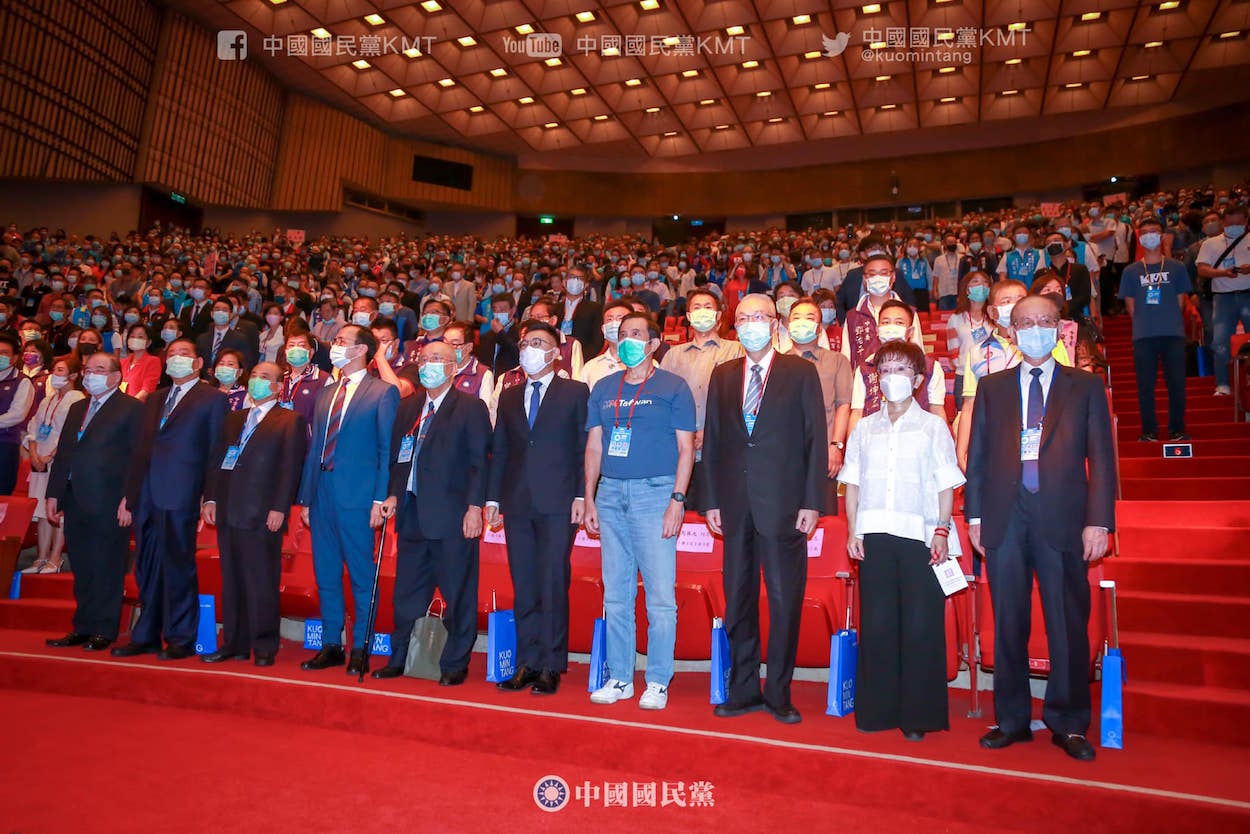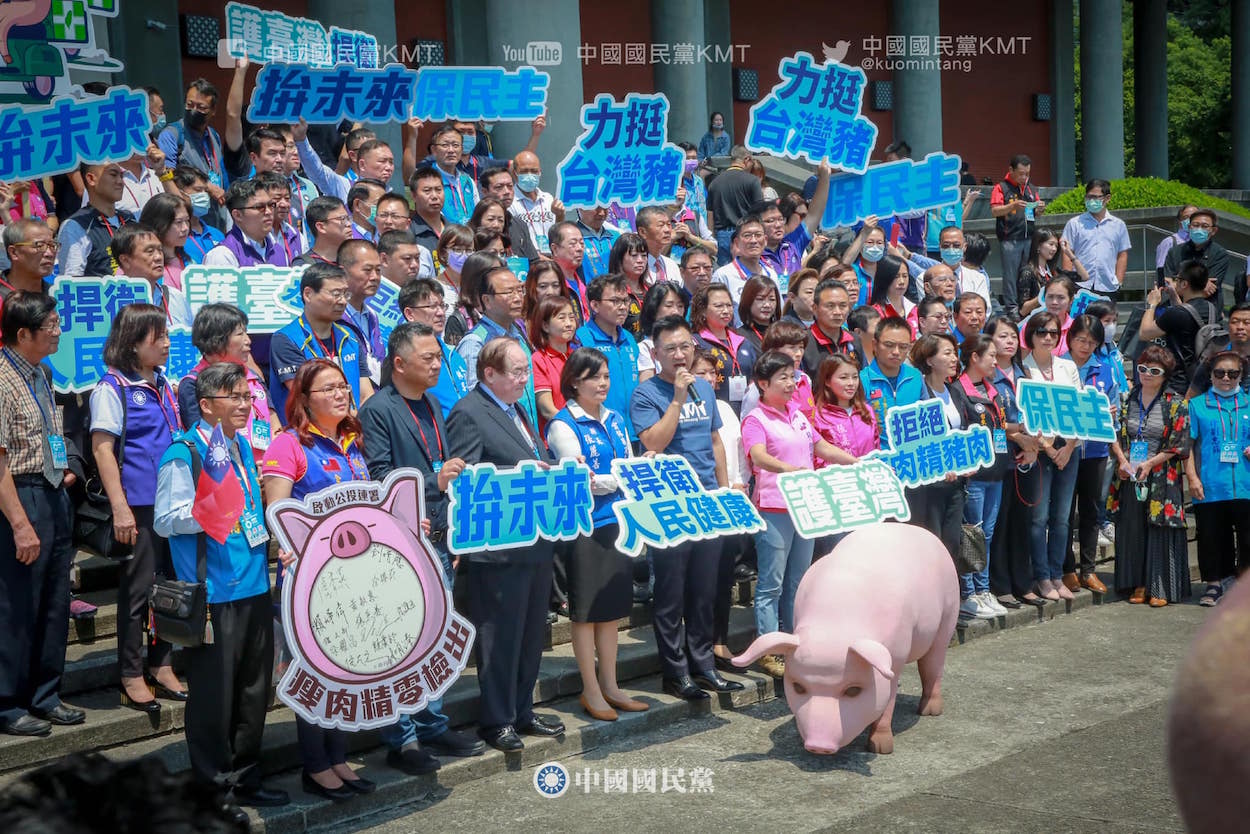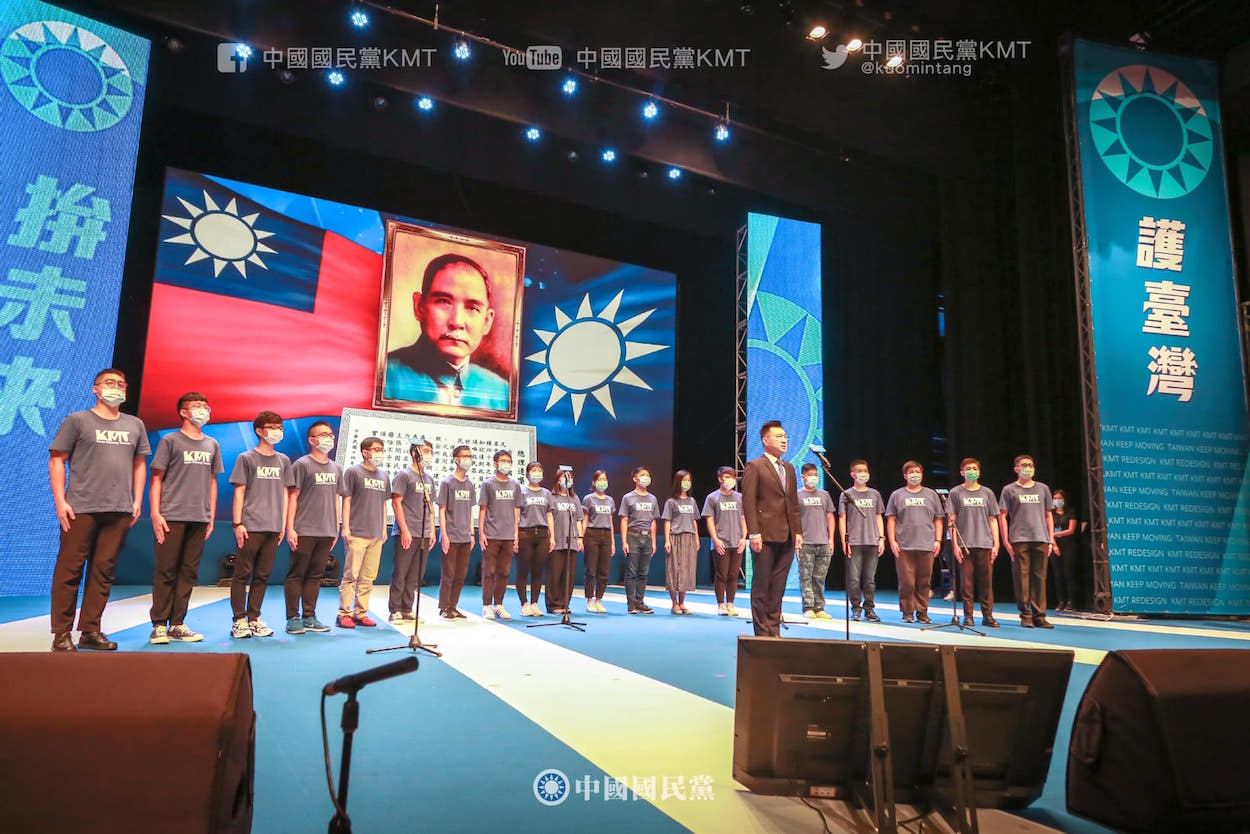by Brian Hioe
語言:
English
Photo Credit: KMT/Facebook
THE KMT NATIONAL Congress, which took place over the weekend, led to the party reemphasizing its commitment to the institutions of the ROC and the 1992 Consensus as the core values of the party. As such, the results of the National Congress indicate that the KMT intends to stay the course where cross-strait policy is concerned. The party intends to continue to position itself as a defender of the ROC against what it frames as the efforts of the Tsai administration to denigrate the ROC.
In his comments, KMT party chair Johnny Chiang asserted that the KMT would retake power in 2024, and emphasized long-term planning for the future, calling for the party to have a “2030 Vision” for Taiwan in ten years. The proceedings of the congress emphasized intergenerational unity, with Chiang appearing alongside past party chairs such as Ma Ying-jeou, Wu Den-yih, Hung Hsiu-chu, Eric Chu, and Wu Po-hsiung, demonstrating continuity between KMT chairs past and present.
 KMT party chairs past and present, including Johnny Chiang, Ma Ying-jeou, Wu Den-yih, Hung Hsiu-chu, Eric Chu, and Wu Po-hsiung. Photo credit: KMT/Facebook
KMT party chairs past and present, including Johnny Chiang, Ma Ying-jeou, Wu Den-yih, Hung Hsiu-chu, Eric Chu, and Wu Po-hsiung. Photo credit: KMT/Facebook
At the same time, this show of intergenerational unity demonstrates the reasons why efforts to reform the party under Chiang have stalled. Chiang was elected as chair in March, promising to reform the party to change its pro-China image and win over young people. At age 48, Chiang is younger than many other party chairs of the KMT in recent memory, generally individuals who are currently in their early seventies.
But one has observed a gradual hardening of the party line under Chiang in past months, likely because of opposition to reform efforts by Chiang from older individuals in the party. This was particularly clear after the KMT’s abortive attempt to occupy the Legislative Yuan to protest Chen Chu’s nomination as head of the Control Yuan in June.
The results, then, are that the status quo of the party from the last time it held political power—during Ma Ying-jeou’s presidency—are reinforced. This occurs despite the fact that the KMT’s years-long crisis as a political party began under Ma Ying-jeou. Ma Ying-jeou’s role within the party has also become increasingly visible, as observed in a recent incident involving Ma engaging political barbs with President Tsai Ing-wen, Vice President William Lai, and Premier Su Tseng-chang.
 KMT politicians assembled with a pig prop. Photo credit: KMT/Facebook
KMT politicians assembled with a pig prop. Photo credit: KMT/Facebook
Indeed, the KMT arrived at maintaining the institutions of the ROC as being the core values of the party through internal polling, which showed that 93.6% of the party supported this view. The proposal that this serve as the core value of the party came from Chiang.
More significantly, the party congress proposed several concrete action items for the party to take, including raising the party dues from 200 NT to 300 NT, and to set term limits for members of the party’s Central Committee so that members can only serve two terms on the Central Committee for a maximum of eight years. Another proposed idea was to set quotas to increase youth representation in the party, requiring that 15% or more of the Central Committee be under the age of 40, and that 20% of party list candidates for the KMT be under 40. In terms of upcoming electoral strategy, the KMT indicated that it will seek to hold a national referendum on the issue of American pork imports.
However, other initiatives by the party aimed at appealing to young people continue to strike as facile, such as setting up a “Digital Chapter” of the party—that is, launching an app—and restarting the Institute of Revolutionary Practice, a party training school. The KMT continues to lag far behind the DPP when it comes to young people using social media. Statements by Chiang and other party leaders suggest that the party views improving its social media presence as a magic bullet that will allow it to regain support among young people. Similarly, speakers invited to speak at the Institute of Revolutionary Practice include politicians highly unpopular among Taiwanese young people, such as Ma.
 Photo credit: KMT/Facebook
Photo credit: KMT/Facebook
No radical change in the party’s fundamentals—or even its messaging—will come under Chiang’s tenure as chair, then. A previous proposal floated replacing the 1992 Consensus with the “ECFA Consensus”—referencing the last major trade deal that the KMT was successful in signing with the Chinese government. The proposal would have likely preserved the substantive contents of the 1992 Consensus, but rebranded it with a different name—yet it may be that party traditionalists may view even rebranding the party’s messaging as too much of a compromise.
That the party remains committed to pursuing strong ties with China, to the exclusion of everything else, is also self-apparent. It was announced earlier today that former majority speaker Wang Jinpyng of the KMT will lead a delegation of 100 KMT representatives to Xiamen later this month, larger than the Czech delegation that visited Taiwan earlier this month. One expects this to do little favors for attempts by the party to turn its image around.
Chiang’s tenure as party chair is scheduled to go until May 2021, seeing as Chiang was elected through a by-election and not to serve a full term as chair. It is to be questioned as to whether Chiang will seek reelection or whether he will see challengers, such as from former Kaohsiung mayor Han Kuo-yu. It was previously an object of heated speculation as to whether Han would be in attendance at the party congress or not, though Han eventually made an appearance. What this augurs for the KMT remains to be seen.

